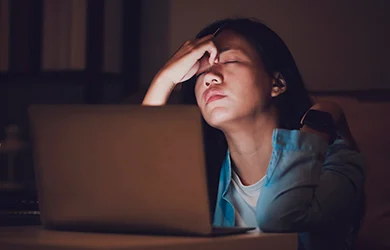What causes trouble falling asleep and how to remedy occasional sleeplessness
Most people need 7-8 hours of “beauty” sleep a night. But, occasional sleeplessness can get in the way of that.


Most people need 7-8 hours of “beauty” sleep a night. But, sleep problems can get in the way of that. Think you have sleep problems? Well, there are a few things you can do to help get the rest you need; it’s also important to know when to talk to your doctor or pharmacist.
What are the signs of occasional sleeplessness?
Look out for these signs and symptoms:
- Trouble falling asleep
- Trouble sleeping soundly
- Waking up too early
- Feeling tired or sleepy during the day
- Feeling irritable, depressed, or anxiou
- Trouble paying attention, focusing, or remembering
- Causing accidents or slip-ups
- Worrying about sleep
What Causes Occasional Sleeplessness?
Sometimes, occasional sleeplessness can be the main issue. Other times, it’s caused by an underlying problem that requires talking with your doctor. Here are some potential causes for occasional sleepless nights:
- Stress (e.g. triggered by life changes or temporary situations related to work, school, health, finances, family, or trauma)
- Irregular schedules
- Poor sleep habits
- Eating too much before bedtime
Solutions and Tips for Sleep Problems
“Keep noise, light, and temperatures low while you sleep”
There’s a lot you can do to help get a better night’s sleep. Try out some of these tips to improve your sleeping habits and hygiene:
- Don’t watch TV, eat, or discuss heavy topics in bed
- Keep noise, light, and temperatures low while you sleep
- Don’t drink fluids after 8 p.m.
- Avoid naps or keep them to 25 minutes
- Avoid bright lights if you wake up at night
- Avoid nicotine, caffeine, alcohol, heavyz meals, and exercise before bed
- Don’t let your pet sleep in your bed
When to Consult a Doctor About Your Occasional Sleeplessness?
If you’re having trouble sleeping, you’re not alone, but symptoms can vary in frequency, duration, and underlying cause. First, ensure that you have a good foundation of proper sleep habits and hygiene. If creating the right environment and habits to get to sleep are not enough, and you are still having trouble falling asleep, you may consider consulting a doctor or a pharmacist.


![[en-ca]What is the Circadian Rhythm & 3 Tips to Keep it In Check](http://images.ctfassets.net/klfgau6xxt2r/4ABFceE7Gz97oJECjlw5Ro/5ab48584e85a1b36b65245da6329efcc/Desktop_Banner_0008_shutterstock_272684912.jpg)
![[en-ca]5 Times You Might Have Trouble Falling Asleep & What to Do About It](http://images.ctfassets.net/klfgau6xxt2r/4qcX02Jwqy1ptpVYrPiSE6/9b659b9b2c216da2d85cd9f2e33b9c0f/Desktop_Banner_0017_shutterstock_1899126031.jpg)
![[en-ca] What is Melatonin? | ZzzQuil](http://images.ctfassets.net/klfgau6xxt2r/4DYuy8QxYvO6ZOWAZrVWKi/2681c98338d4f53dced83867808796e7/Desktop_Banner_0022_shutterstock_1536338213.jpg)